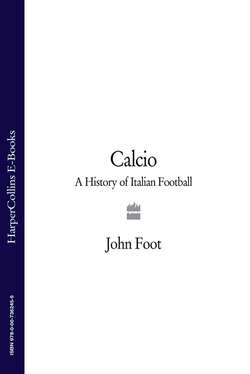Читать книгу Calcio: A History of Italian Football - John Foot - Страница 35
Rules, Laws and the Italian Referee
Оглавление‘Every game is under the control of a referee, who has all the authority necessary in order to make sure that the Rules of the Game are respected in the game in which he officiates’
Italian football federation Rule Book, Rule 5
Referees interpret a set of rules, in a context in which everyone has their own opinion on every single moment of every game. They have to make an instant decision, one way or the other, based purely on what they have seen. As if that was not difficult enough, many of the 22 players on the pitch (as well as managers and fans) often try and pretend that something different has happened, or simply hide reality from the referee’s probing eyes. Players dive, appeal for throw-ins after clearly kicking the ball out, crash to the ground screaming with pain when they have not been touched, try sneaky handballs. They also complain, constantly, about everything. Football games, like prison riots, are ‘essentially contested’.6 Agreement is not only hard to come by, it is impossible.
All of this is much more difficult in Italy, for precise political and historical reasons. As historian Paul Ginsborg has written, ‘the referee’s authority is perforce uncertain, but it is made much more so in Italy by the almost universal climate of suspicion, if not derision, that accompanies his decisions’. In the relationship between the Italian football fan and the referee, Ginsborg continues, ‘it is not difficult to discern…a series of emotions – suspicion, contempt, cynicism, even hatred – that characterize the relationship between Italians and the state’.7 This relationship, moreover, is not confined to Italian referees alone – although it is most pervasive with regard to the national championship. Foreign referees are also accused of the same ‘crimes’, and have been blamed for the failures of various Italian teams during various World Cups. Occasionally a simple solution to the ‘referee question’ in Italy has been proposed: import non-Italian officials. An experiment of this type was tried in the second half of the 1950s – with little success – and was unearthed again as a possible solution in the twenty-first century, for key championship games.
Football rules have to be interpreted. Although the written rules remain the same, the application of those rules differs across football cultures, and the official representatives of these cultures are the referees. Thus, many tackles that are fouls in Italy are not fouls in the British game. In Italy there is a special phrase for our more liberal style of officiating: ‘refereeing, English style’ (un arbitraggio all’inglese). Moreover, the Italians are very clear that a straight-legged tackle – what they call gamba tesa – is always a foul, even if you get the ball. In England we sometimes call this ‘foot up’, but it is by no means always a foul, especially if the tackler wins the ball. In Italy the idea is that this kind of tackle is dangerous, per se, and therefore a foul. Once again, the written rules are the same, their application is not, although the globalization of football has led to more consistency across different championships.
